Search volume is probably the most frequently used metric in SEO. It helps us gauge the popularity of various keywords and predict the search traffic we may get from ranking for them.
But all too often, inexperienced SEOs take the keyword search volume metric at its face value, which leads to poor marketing decisions and waste of valuable business resources.
In this post, we’re going to take a closer look at the search volume metric, explain what it is, where it comes from, and how it may sometimes lead you astray.
Keyword search volume is an SEO metric that tells you how many times per month, on average, a certain keyword is searched for in a specific location. More often than not, search volume refers to the number of searches in Google, but this metric can also refer to other search engines too.
One important distinction to point out is that search volume reflects the number of actual searches of a keyword rather than the number of unique people searching for it.
Thus, if a keyword has a monthly search volume of 100, those searches could have been performed by 100 different people, or it could have been just 10 people making 10 searches each.
That small clarification is only the tip of the iceberg of all the things that people often get wrong when analyzing the search volume of a keyword.
So let’s discuss five more things you need to know in order to make better use of this metric.
Most SEO tools report search volume as an annual average.
It’s not a big deal for search queries that have a relatively consistent search demand throughout the year. But it can be quite misleading for seasonal search queries or hot trends.
Let’s compare the search volume trends of the following two keywords: “content marketing” and “NFT.”
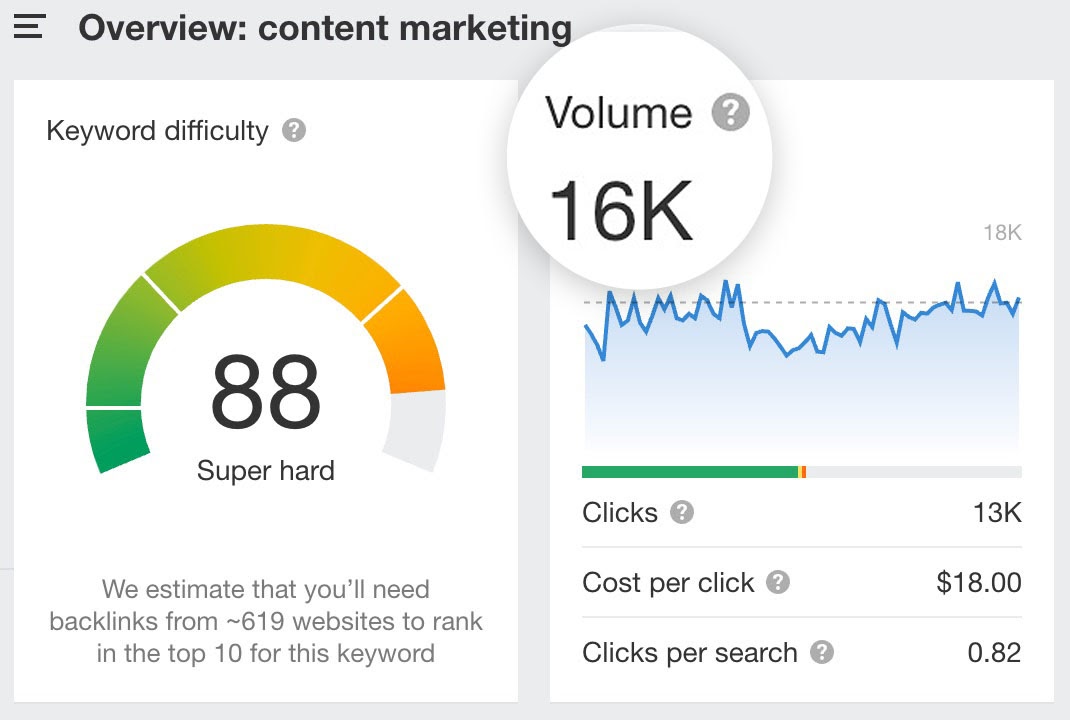
The keyword “content marketing” has been hovering between 12k and 17k searches a month in the course of the year. So its annual average of 16k is a reasonable prediction of the search volume that it is likely to get in the months to come.
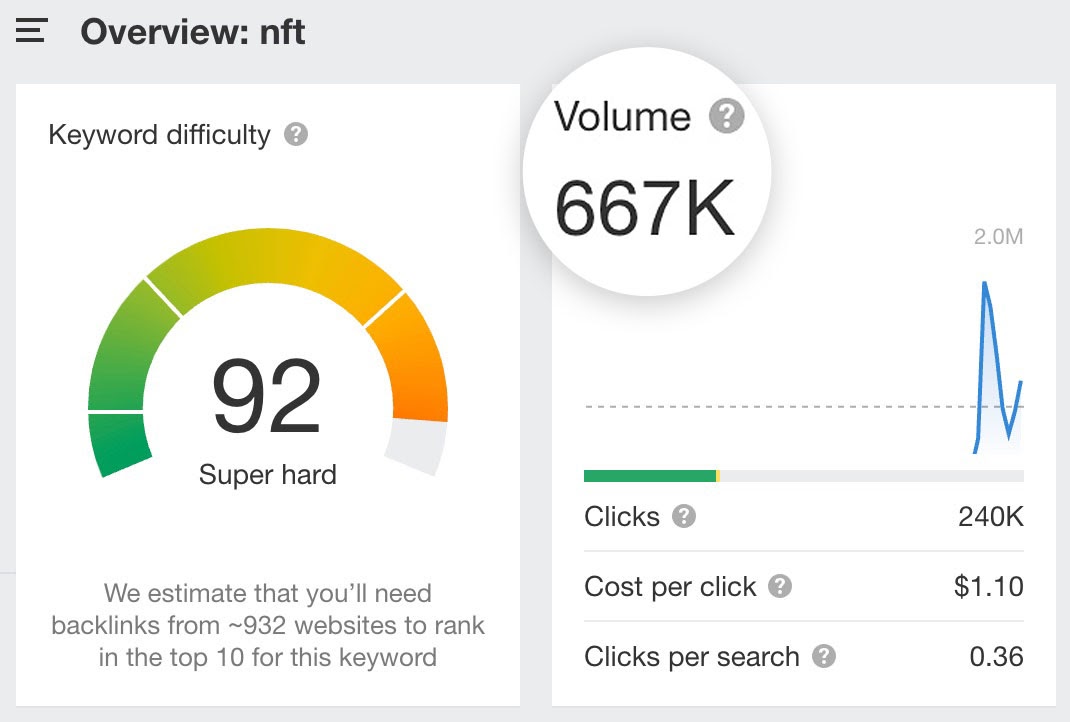
It’s an entirely different story for the keyword “NFT,” though. In the course of one year, it went from practically nothing to a whopping 2.3 million searches in March. Then it dropped to 374k in June and went up to 952k in August.
In other words, it is quite hard to predict how its search volume is going to fluctuate in the coming months and where it will eventually settle once the craze over NFTs subsides.
What I want to illustrate with these two examples is that search volumes can be quite volatile. And the 12-month average number that SEO tools report may not perfectly match the monthly search volume of that keyword by the time you rank for it.
The fact that people search for something doesn’t necessarily mean they’re going to click on any of the search results.
In fact, Google’s goal is to satisfy its users right there and then without having them “waste time” clicking on any of the search results. According to a recent study, two-thirds of Google searches in 2020 ended without a click.
Two-thirds of Google searches in 2020 ended without a click.
For example, the keyword “elon musk age” gets 37k searches per month (on average). But the number of clicks on the search results (according to Ahrefs) is just 6.3k.
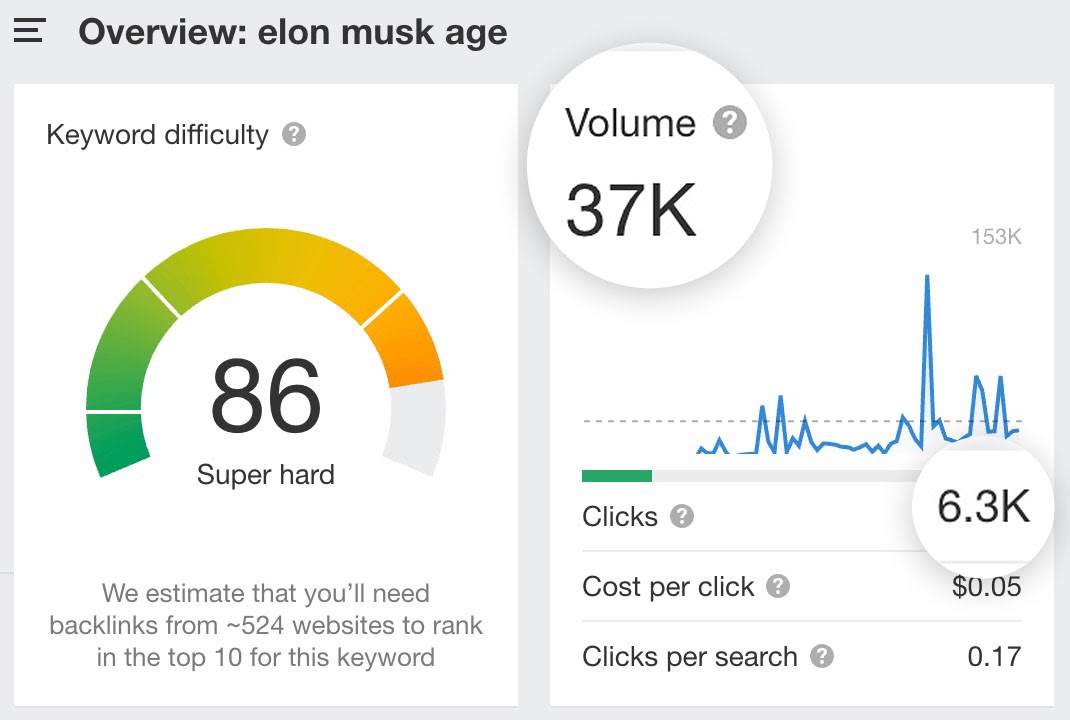
That happens because Google gives an instant answer to that question, dissuading users from clicking on any of the search results:
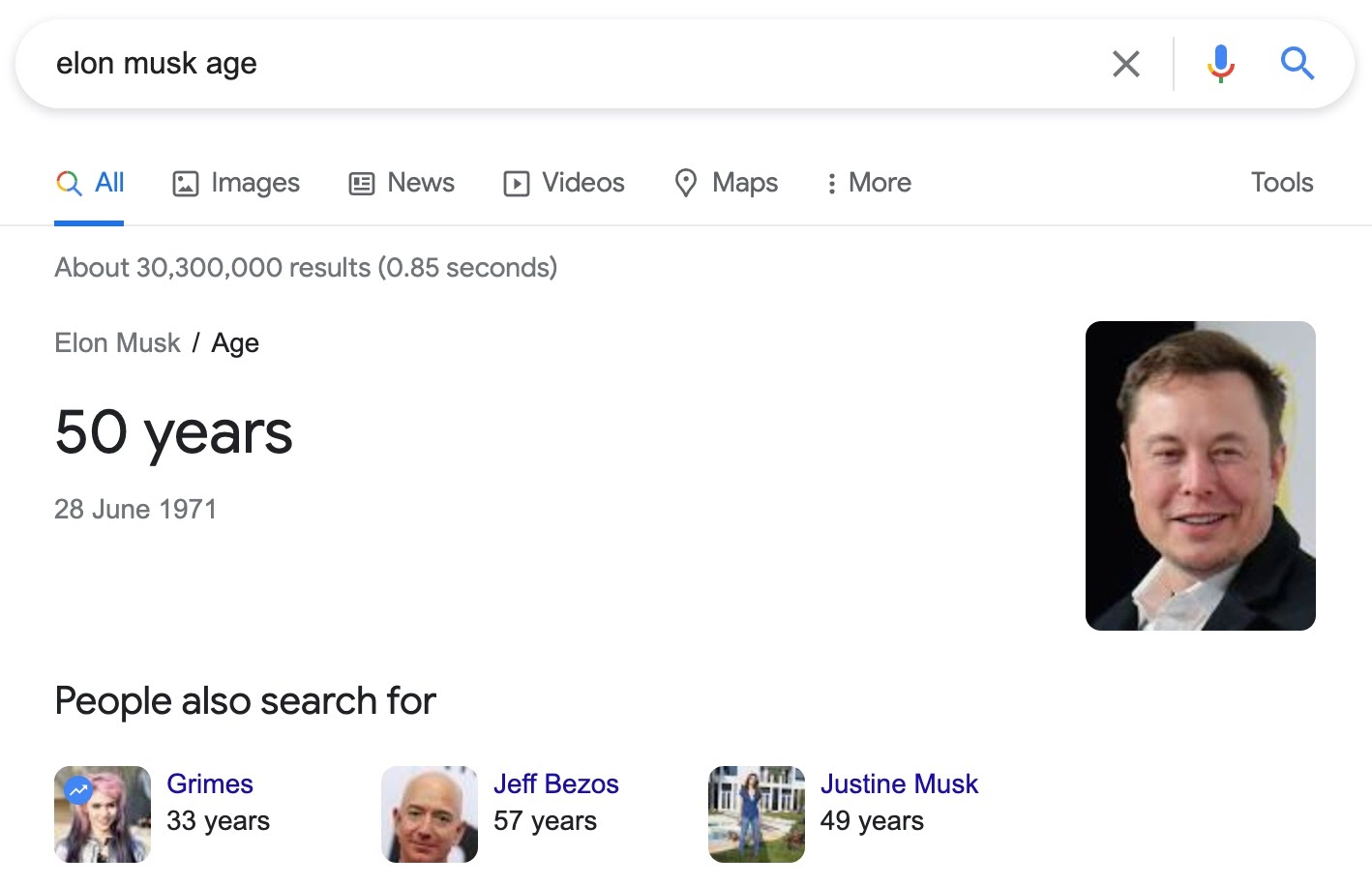
So if a search query has a large search volume, it doesn’t necessarily mean that it will bring you lots of search traffic. Google may simply display the answer right in its search results.
There’s one other thing that may steal those precious clicks away from you: Google Ads.
As of today, Google displays up to four paid search listings above the organic search results. And if you trace the visual history of these paid placements, it becomes painfully obvious Google is trying to make those ads nearly indistinguishable from the organic search results.
It also tends to embellish those ads with images and sitelinks to maximize the real estate they occupy and push the organic search results further down below.
In other words, ranking at the top for some popular keyword no longer guarantees that you’re going to get lots of clicks from it.
Ranking Top3 in Google in 2021:#AD1-Link-Link-Link
-Link#AD2 (+🖼️)
- links
- button#AD3 (+🖼️)
#1 Organic result
- links#PeopleAlsoAsk
-Q1-Q2-Q3
-Q4#KnowledgePanel (for a related term)
- 🖼️🖼️- text- link- link- link
- link#PeopleAlsoSearchFor
🖼️🖼️🖼️ pic.twitter.com/BbAfwwwjVk — Tim Soulo 🇺🇦 (@timsoulo) June 29, 2021
Even if you check the search results for the keyword you want to rank for and there are no ads there, there’s no guarantee ads won’t appear in the future. In fact, by ranking at the top for a keyword, you’re pushing the pages of your competitors down below and leaving them without search traffic; this may very well provoke them to start running ads.
Google Keyword Planner is widely regarded as the best source of keyword search volume data, as it comes directly from Google itself. And it’s not a secret the vast majority of SEO tools pull their keyword search volumes from GKP.
But how accurate are the search volume numbers in GKP?
Well, there’s one source of data that is universally deemed the “single source of truth” when it comes to search volumes: Google Search Console.
If your website consistently ranks at the top of Google for a certain keyword, the number of “impressions” your page gets for that keyword will be its actual search volume.
This means that we can easily study the accuracy of search volumes in GKP if we compare the search volumes with the actual impressions of the same keywords from GSC.
And that is exactly what we did in our recent experiment.
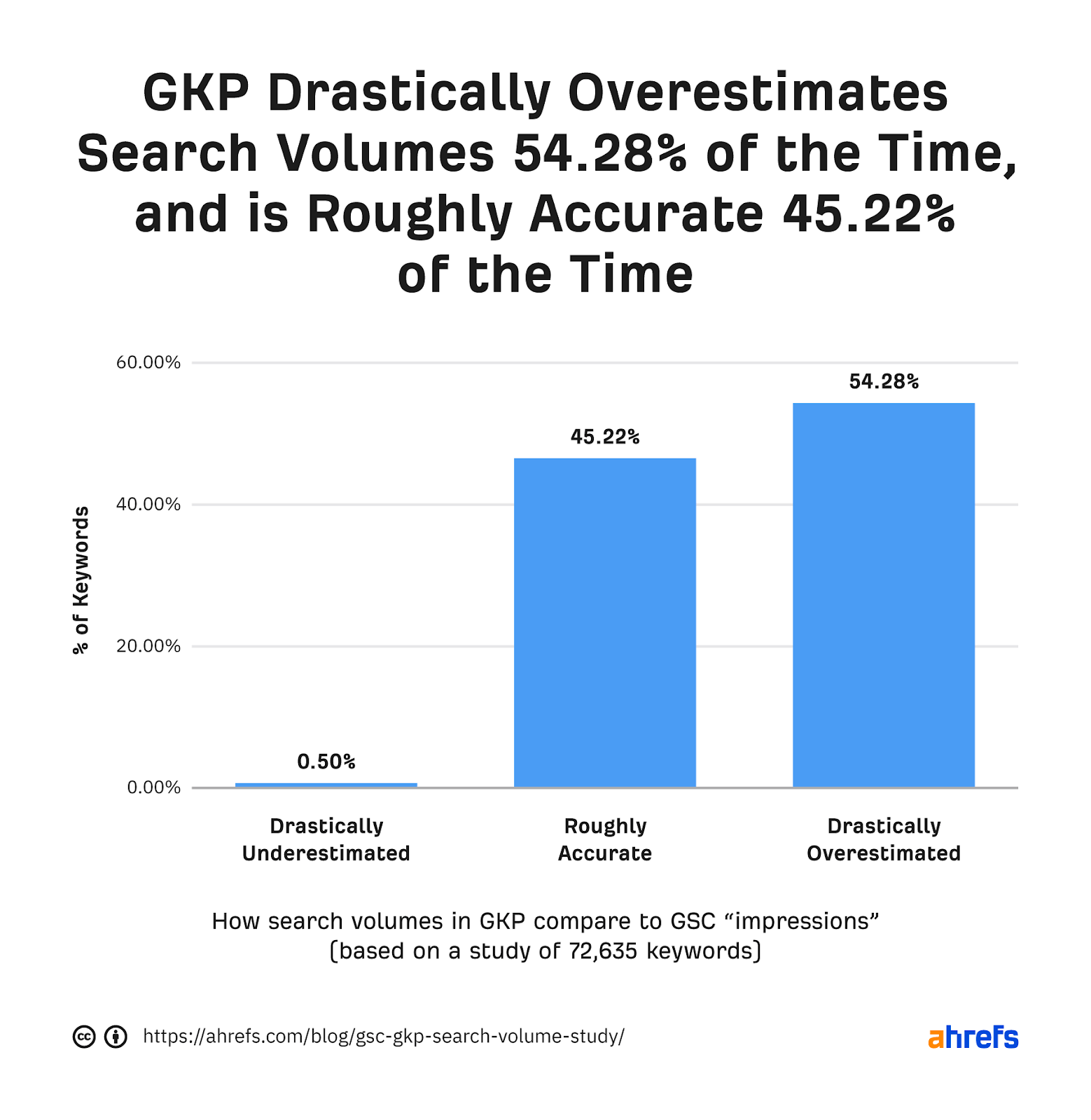
It turned out that the search volumes in GKP were “roughly accurate” in just 45% of cases. In the rest of the cases, GKP search volumes deviated from GSC impressions by a pretty large margin.
In other words, it is quite a stretch to call the search volumes in GKP “accurate.” And we can’t even criticize GKP for this, as it is a tool for advertisers, not SEOs.
GKP tends to blend search queries with similar meaning together in one group without an option to see a distinct search volume for each of those queries. This is quite handy for advertisers but can be a real headache for SEOs.
For example, the following six keywords will all be blended into one:
- pc games free download
- free pc games download
- free games download for pc
- download free games for pc
- free pc game downloads
- download pc games free
- free games to download for pc

And most SEO tools will mimic this behavior because they (allegedly) take their search volumes from GKP. So they will display the same search volume for each of these keyword variations.
But here at Ahrefs, we mix a few other data sources into our search volume estimates (including a few years of historical clickstream data), which allows us to “un-group” many of such keyword clusters and display a distinct search volume for each individual keyword:
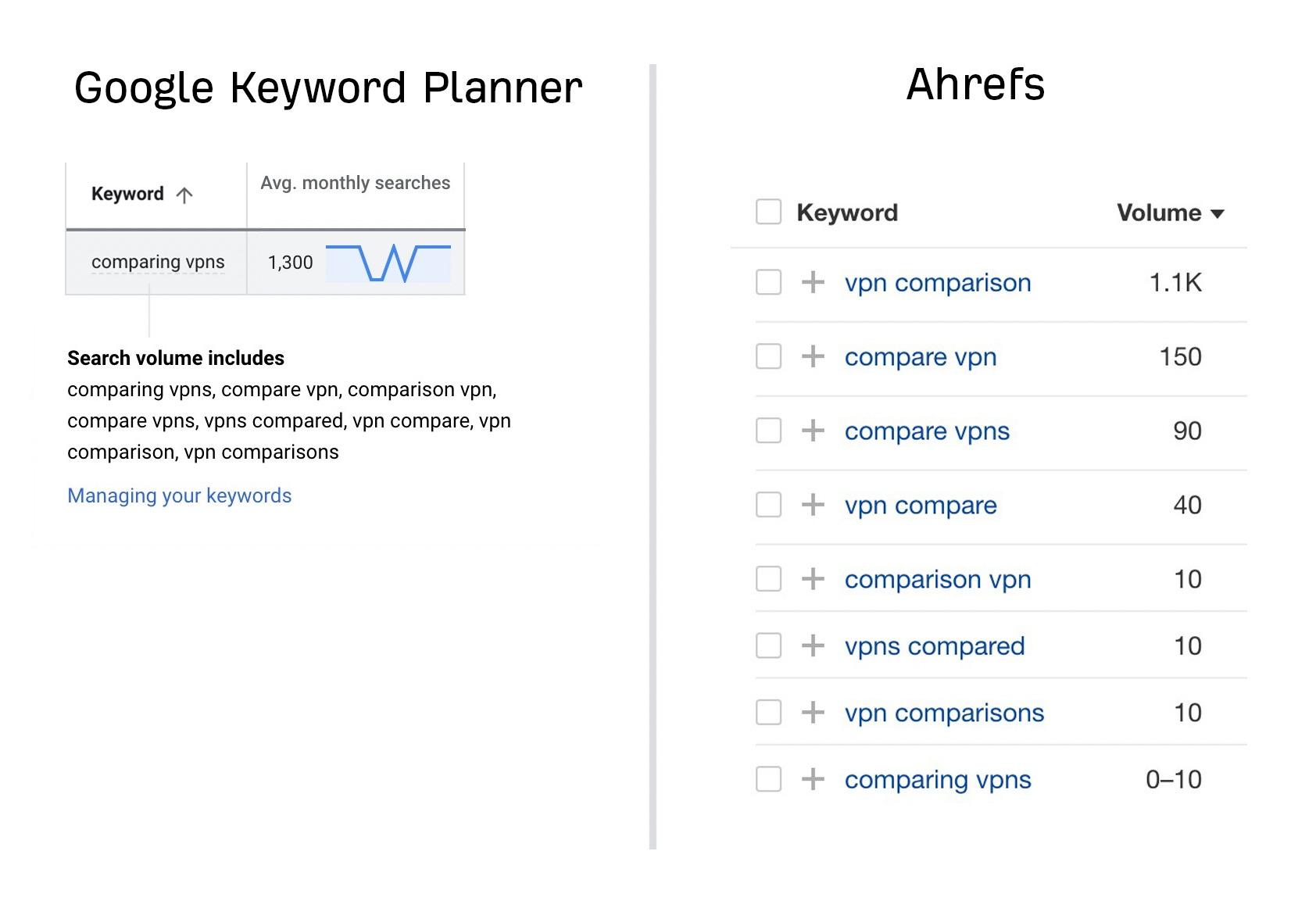
This un-grouping makes Ahrefs’ search volumes a bit more accurate than those of GKP. And yet our search volumes are still just estimations rather than exact values that many of our users will love to see.
The primary use case of the keyword search volume metric in SEO is to estimate the potential organic search traffic that your page may get if it ranks for the keyword, right?
Well, let’s look at the following two keywords:

If we compare their Global (i.e., worldwide) search volume, the keyword “local SEO” seems to be 27 times more popular than the keyword “submit website to search engines.”
So does this mean that the #1 ranking page for “local SEO” should get vastly more search traffic than the #1 ranking page for “submit website to search engines?”
Let’s check that in Ahrefs’ Site Explorer:


It turns out our assumption is completely wrong. The top-ranking page for a 27 times less popular keyword seems to be getting two times more search traffic.
How come?
Well, this happens because pages don’t just rank for a single keyword. If you look attentively at the two screenshots above, you’ll see that the top-ranking page for “local SEO” is ranking in Google for 311 keywords (look for the “Organic keywords” tile), with eight of them ranking in the top 3 positions.
As for the #1 page for “submit website to search engines,” it ranks in Google for a total of 1,400 keywords, with 201 of them ranking in the top 3 positions.
Here are some of these keywords:
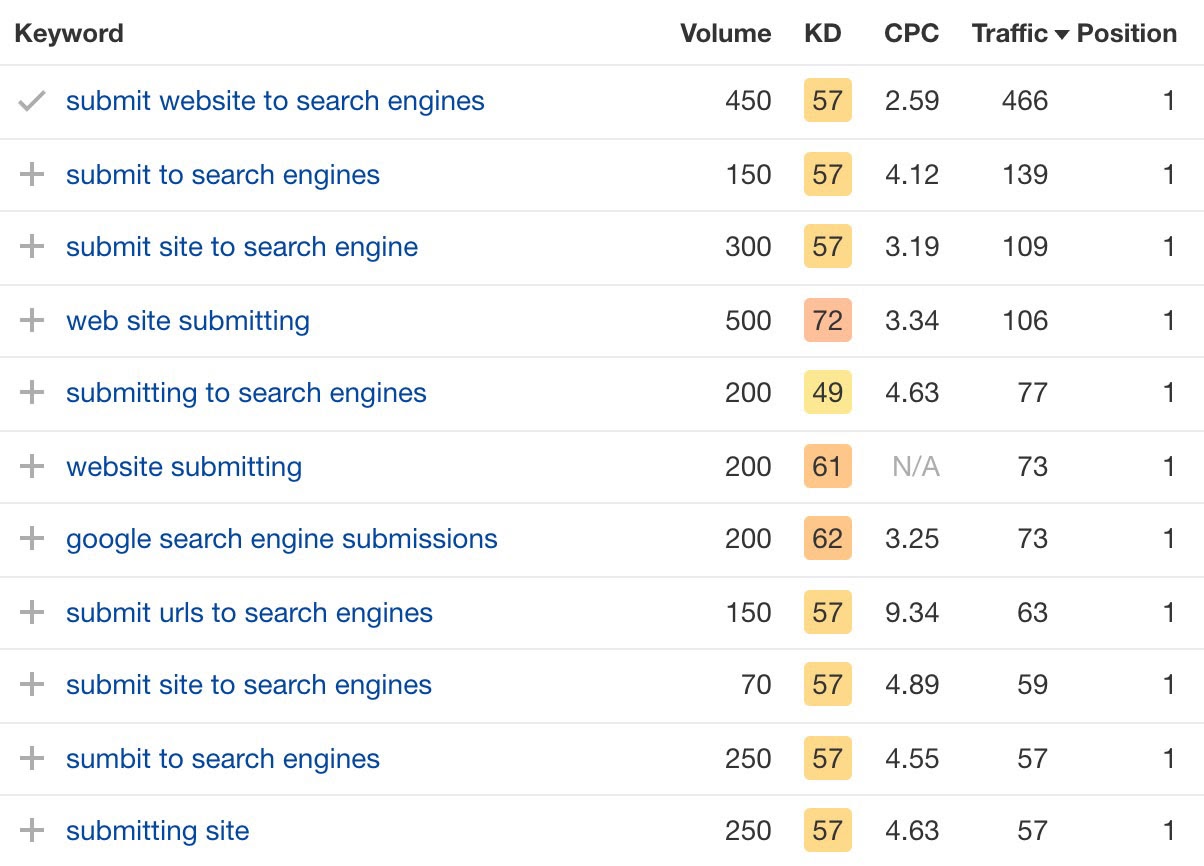
Whatever search query you have in mind, different people will phrase it differently. But Google is smart enough to understand that all these people are basically looking for the same thing. It, therefore, ranks the same page for all these search query variations.
We studied this “phenomenon” back in the day, and it turned out the average top-ranking page would also rank for about a thousand similar keywords.
This means that you can’t blindly rely on the search volume of individual keywords when estimating their search traffic potential. What you need to do instead is examine the top-ranking pages and see how much search traffic they get in total from all the keywords they rank for.
Here at Ahrefs, we got so enamored with this concept that we have created a unique metric called Traffic Potential:
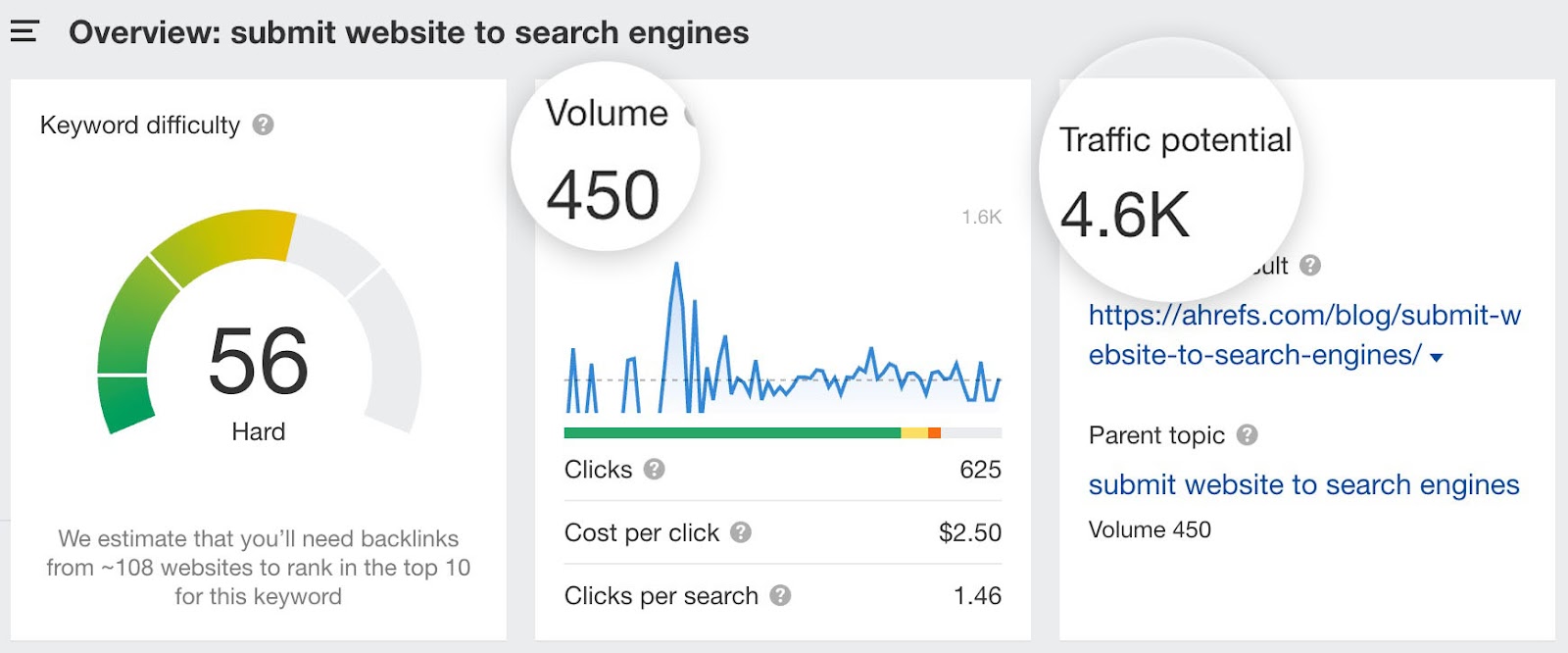
For any keyword that you see in Keywords Explorer, we pull the top-ranking page and look up how much total search traffic it gets from all the keyword variations that it ranks for in Google. That value becomes the Traffic Potential of that keyword.
Here in Ahrefs’ content marketing team, we’ve been doing that manually for quite a few years, and it has helped us a lot in choosing the right topics to target. But now this metric is finally added to Keywords Explorer for everyone to use.
So these are the five main things that rookie SEOs often overlook when they deal with the keyword search volume metric.
Now that you’re armed with this knowledge, I’m sure you’ll no longer treat the search volume metric at its face value, which should vastly improve the quality of your SEO decisions.
And there’s one last thing I want to mention. It seems a bit too obvious to put it in the body of this post, but it’ll feel kind of incomplete without it:
Never select keywords based on their search volume alone.
There’s so much more to keyword research than simply looking for keywords with the biggest search volume.
Here are some other questions to consider:
- Would this keyword bring value to my business?
- Would this keyword result in any sales?
- Would I be able to beat the top-ranking pages for this keyword?
- What would it take to rank for this keyword?
Always keep those questions in mind when choosing what keywords to go for.